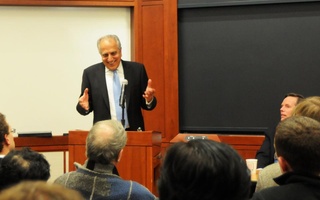His Excellency Najib-Ullah, Afghanistan's Ambassador to the United States, paid a one day visit to the University yesterday.
Najib-Ullah, who was minister of education in Afghanistan from 1946-49, said that the purpose of his visit was both to gain new ideas about education and to see a University that he had known about from his youth.
His activities here included talking with University officials, visiting a seminar and speaking on Afghanistan foreign policy.
In his talk at Littauer last night he pointed out that Afghanistan was a small state, with a population of 12 million, surrounded by much greater powers. He explained that this forced his country to follow a policy of neutrality to avoid being swallowed up by one or the other of the great powers.
Read more in News
Tennis Team Defeats Army, 6-3, Awaits Home Opener Versus PennRecommended Articles
-
A Dangerous Insult and A Dangerous SilenceFor a generation supposedly defined by the War on Terror, our generation’s response to military events now follows a very apathetic and predictable path.
-
 Former Ambassador Khalilzad Discusses Middle East Peace
Former Ambassador Khalilzad Discusses Middle East Peace -
Opium in AfghanistanThe Afghan narcotics industry cannot be forgotten. It not only causes untold misery for addicts and their families, but also emboldens the insurgency, fuels corruption, and undermines governance and development.
-
The Importance of ServiceAfter watching the images of the falling towers, I drove to the nearest recruiting station and joined the United States Army. Neither retaliation nor anger propelled me to sign up.
-
Brown and Warren Spar in DebateLOWELL, Mass.—Flushing out campaign trail accusations and platform promises, U.S. Senator Scott Brown and Democratic challenger Elizabeth Warren disagreed on job creation, tax policy, and immigration reform Monday during the second debate for the Massachusetts U.S. Senate race.
-
Report Calculates High Cost of Iraq-Afghanistan WarAs the U.S. presence in Iraq and Afghanistan winds down, a recent report by Harvard Kennedy School lecturer Linda J. Bilmes ’80 predicts that the aggregate cost of the wars in Iraq and Afghanistan will fall between $4 and $6 trillion.













